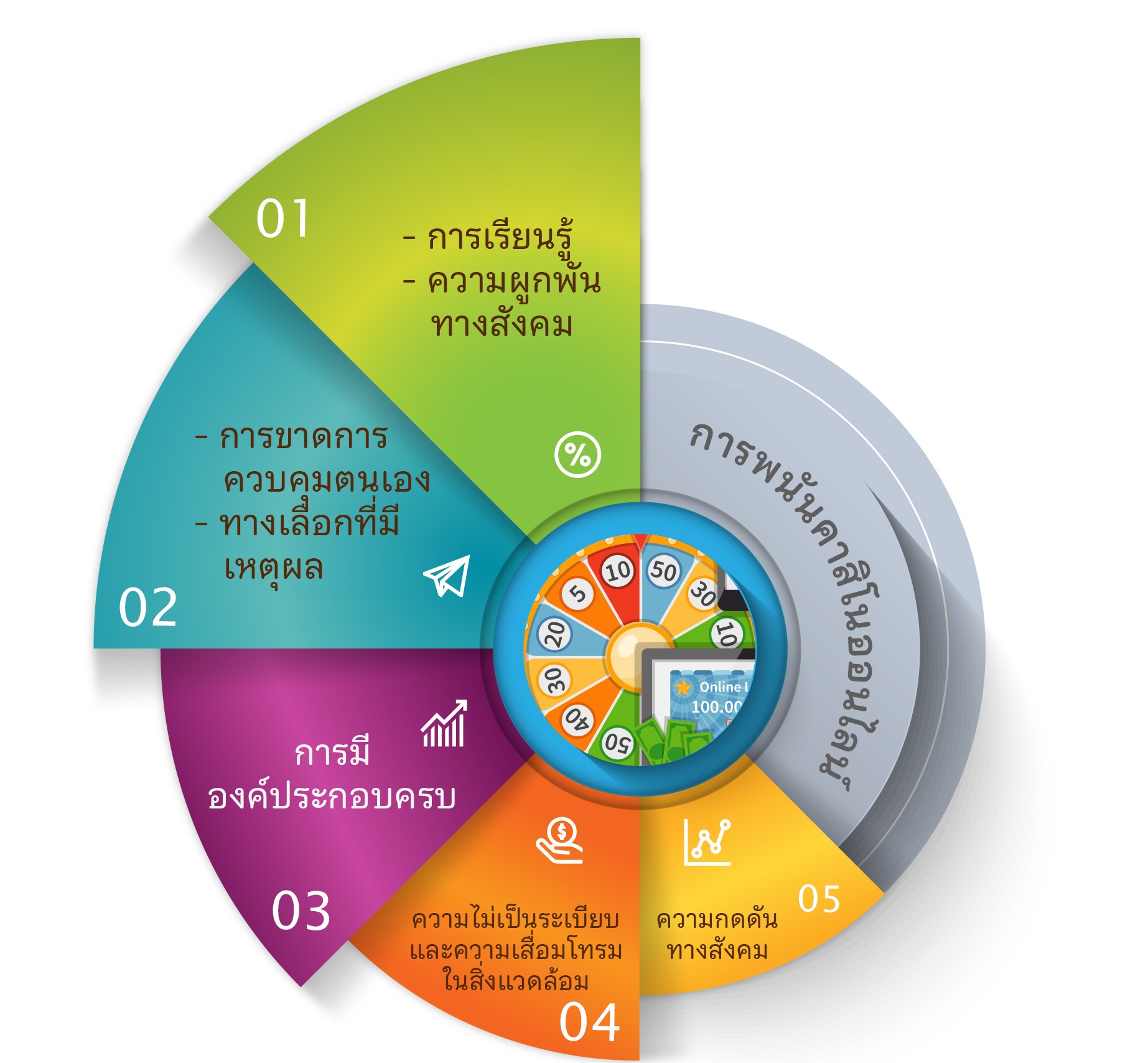Online Casino Gambling among Juveniles in Bangkok Area
Main Article Content
Abstract
This research aimed to study the problems and causes of online casino gambling among juveniles in Bangkok. The study employed a qualitative research approach, collecting data through in-depth interviews with 15 juveniles and youth engaged in online casino gambling.
The results revealed that:
1. Online casino gambling involves games of chance accessed via the internet, such as card games, table games, slot machines, and roulette. It is driven by advancements in information and communication technology, making it easily accessible through smartphones. Participants funded their gambling through various sources, including pocket money, allowances from parents, borrowing from friends, and even online loans. Motivations for gambling included observing others winning rewards or receiving praise, appealing advertisements, and ease of access. However, online gambling adversely affected education, lifestyle, mental health, social relationships, and finances. Educational impacts included academic failure, while mental health issues ranged from stress to risky behaviors. Social impacts involved conflicts within families and peer groups, and financial problems included debt and poor money management.
2. Factors contributing to online gambling among Juveniles in Bangkok, including social learning, weak social bonds, poor self-control, rational decision-making, motivational goals, lack of effective guardianship, environmental disorder, and social pressures. These findings highlight the urgent need for multi-sectoral interventions to address this growing issue.
Article Details

This work is licensed under a Creative Commons Attribution-NonCommercial-NoDerivatives 4.0 International License.
เพื่อให้เป็นไปตามกฎหมายลิขสิทธิ์ ผู้นิพนธ์ทุกท่านต้องลงลายมือชื่อในแบบฟอร์มใบมอบลิขสิทธิ์บทความ ให้แก่วารสารฯ พร้อมกับบทความต้นฉบับที่ได้แก้ไขครั้งสุดท้าย นอกจากนี้ ผู้นิพนธ์ทุกท่านต้องยืนยันว่าบทความ ต้นฉบับที่ส่งมาตีพิมพ์นั้น ได้ส่งมาตีพิมพ์เฉพาะในวารสาร วิชาการธรรม ทรรศน์ เพียงแห่งเดียวเท่านั้น หากมีการใช้ ภาพหรือตารางของผู้นิพนธ์อื่นที่ปรากฏในสิ่งตีพิมพ์อื่นมาแล้ว ผู้นิพนธ์ต้องขออนุญาตเจ้าของลิขสิทธิ์ก่อน พร้อมทั้ง แสดงหนังสือที่ได้รับการยินยอมต่อบรรณาธิการ ก่อนที่บทความจะได้รับการตีพิมพ์References
กรุงเทพธุรกิจ. (2564). การพนันออนไลน์ในประเทศไทย. เข้าถึงได้จาก https://www.bangkokbiznews.com/news/detail/943937
พฤตินัย พราวพันธุ์. (2562). การพนันคาสิโนออนไลน์ภัยใกล้ตัว. เข้าถึงได้จาก https://www.dsi.go.th/Files/25620626การพนันคาสิโนออนไลน์ภัยใกล้ตัว.pdf
มธุรดา สุวรรณโพธิ์, ภาสกร คุ้มสิริ, ธนาภรณ์ กองพล, นภาดา สุขสัมพันธ์ และสันติภาพ นันทะสาร. (2560). ปัญหาพนัน เกม และการประยุกต์ใช้เครื่องมือเพื่อการตระหนักรู้ปัญหาพนันในชุมชน. (รายงานการวิจัย). นนทบุรี: กรมสุขภาพจิต กระทรวงสาธารณสุข.
วิทยากร เชียงกูล. (2562). เสพติดพนัน-ความใหญ่โตของปัญหาและแนวทางแก้ไข. กรุงเทพฯ: เดือนตุลา.
ศูนย์ศึกษาปัญหาการพนัน. (2565). รายงานศูนย์ศึกษาปัญหาการพนัน ปี 2565. กรุงเทพฯ: เดือนตุลา.
Bandura, A. (1977). Social learning theory. Englewood Cliffs, NJ: Prentice Hall.
Becker, G. S. (1976). The Economic Approach to Human Behavior. Chicago, IL: University of Chicago Press.
Cohen, L. E., & Felson, M. (1979). Social change and crime rate trends: A routine activity approach. American Sociological Review, 44(4), 588-608. https://doi.org/10.2307/2094589
Derevensky, J. L., & Gilbeau, L. (2015). Adolescent gambling: Twenty-five years of research. Canadian Journal of Addiction, 6(2), 4-12. https://doi.org/10.1097/02213090-201506020-00002
Di Censo G., Delfabbro P., & King D. L. (2024). The impact of gambling advertising and marketing on young people: A critical review and analysis of methodologies. International Gambling Studies, 24(1), 71-91. https://doi.org/10.1080/14459795.2023.2199050
Gainsbury, S. M. (2015). Online gambling addiction: The relationship between internet gambling and disordered gambling. Current Addiction Reports, 2(2), 185-193. https://doi.org/10.1007/s40429-015-0055-9
Gonzalez, R. M., Quinn, P., Gardiner, J. & Sutcliffe, A. (2023). 47 Problematic online gambling and predictors of participation in adolescents. Archives of Disease in Childhood, 108, A101. https://doi.org/10.1136/archdischild-2023-328738.47
Gottfredson, M. R., & Hirschi, T. (1990). A general theory of crime. Stanford University Press.
Hirschi, T. (1969). Causes of delinquency. University of California Press.
Howarth, E., Dash, M. & Olaoye, F. (2024). Exploring the Growth, Regulations, and Social Impact of the Online Gambling Industry. Retrieved from https://easychair.org/publications/preprint/lCFC
Lortrakul, S. (2023). Enforcement of Online Gambling Laws. International Journal of Sociologies and Anthropologies Science Reviews, 3(6), 191-200. https://doi.org/10.60027/ijsasr.2023.3420
Merton, R. K. (1938). Social structure and anomie. American Sociological Review, 3(5), 672-682. https://doi.org/10.2307/2084686
Rossi, R., & Nairn, A. (2022). New developments in gambling marketing: The rise of social media ads and its effect on youth. Current Addiction Reports, 9(4), 385-391. https://doi.org/10.1007/s40429-022-00391-7
Saúl, R. P. V, Lucía, B. O. A., Guisell, P. M. Y., & Melisa, P. A. A. (2023). Family factors and personal characteristics of gambling in students from seventh to eleventh grade of the Instituto Experimental La Asunción, Lechecuagos, León, III Quarter. Mathews Journal of Nursing, 5(6), 32. https://doi.org/10.30629/0321MJNS.2023.0006
Siraj, R., Najam, B., & Ghazal, S. (2021). Sensation Seeking, Peer Influence, and Risk-Taking Behavior in Adolescents. Education Research International, 2021, 1-8. https://doi.org/10.1155/2021/8403024
Wilson, J. Q., & Kelling, G. L. (1982). Broken windows: The police and neighborhood safety. Atlantic Monthly, 249(3), 29-38.

